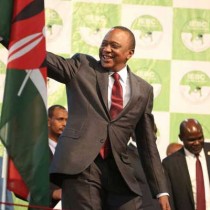
What the hell just happened in Kenya? Brief history for aliens
Let’s pause for a minute and reflect on what just happened in Kenya.
President Uhuru Kenyatta was on Monday declared the winner of the October 26 repeat presidential election, with 98.2 per cent of the vote.
For Kenyans, what follows might be normal, but if you just arrived from Mars or live in remote corner of Cape Verde, maybe not.
At the end of 2002, Daniel arap Moi steps down after 24 years in power. His ruling party Kanu, in power since independence, fields Uhuru Kenyatta as its presidential candidate.
MWAI KIBAKI
He is beaten by the opposition’s Mwai Kibaki, the frontman for the National Rainbow Coalition (Narc), the largest democratic coalition to ever win power in Africa.
Mr Kenyatta concedes defeat, rather magnanimously, the first time a losing candidate had done so in East Africa.
Narc unravelled faster than perhaps any other coalition had, with then minister Raila Odinga – falling out with Mr Kibaki. In 2005 Mr Kibaki sacked the "rebels”, including Mr Odinga, and his running mate, Mr Kalonzo Musyoka.
This polarisation was taken into the 2007 election, with Raila – (now Deputy President William Ruto) as his political wing man - facing off with Kibaki as front runners. The election ended in dispute, and the country faced its worst violence since independence.
COALITION
Up 1,400 people were killed, and over 500,000 displaced. To end the crisis, a Grand Coalition government, the first in the region, was negotiated with Kibaki and Raila and his allies, including Ruto and Kalonzo, sharing in the spoils. Raila became prime minister, and Uhuru, Kibaki’s rival in 2002, became deputy prime minister as Kibaki’s man.
In 2010, Kenya finally passed a new constitution, one of the most progressive on the continent. In 2011, in its first imperial expedition, Kenya sent its troops into southern Somalia to hunt down Al-Shabaab militants.
Because of the 2008 post-election violence, the International Criminal Court (ICC) gets involved. Among the people whom it indicted in 2011 for the violence were Uhuru and Ruto.
These erstwhile rivals, team up as running mates, and in 2013 the contest is between them and Raila and Kalonzo.
Uhuru wins, and thus he and Ruto become the first duo indicted by the ICC to ascend to a country’s leadership through an election.
SUPREME COURT
In 2014, the ICC dropped the charges against Uhuru, and 2016 the ones against Ruto.
Fast-forward to August 8, 2017 and the two teams tangle again in the elections. Raila goes to court, as he did in 2013, and lo behold, in a stunner, the Supreme Court in September, in the first such action in Africa, overturns the election.
October 26 is set for a rematch, and citing a failure by the Independent Electoral and Boundaries Commission (IEBC) to undertaken the changes necessary for a free, fair and credible poll, Raila pulls out with barely three weeks to go.
In the process, if we are not wrong, he became the first candidate to pull out of an election that was happening as a result of what had been a historic legal victory for him.
However, though he quit, again in true Kenyan fashion, his name was kept on the ballot. Things were to get stranger. Uhuru won on a turnout of 38.84 per cent, no surprises there.
COUP
However, although Raila had withdrawn, he got 73,228 votes (1 per cent) as an "invisible” candidate, still beating Uhuru’s main rival Ekuru Aukot in this round of the contest, who got 21,333 (0.28 per cent) of the vote.
If you consider the latest election to be a continuation of a series of events that started in late 2002, then in 15 years Kenya has lived a political life that no other African country has experienced in the last 60 years.
The only thing that hasn’t happened in this period is a military coup.
If you go back to independence, Kenya is alone in Africa in having Uhuru and Raila as the politically dominant princelings of the pair (Jomo Kenyatta and Jaramogi Oginga) who brought a country to independence as president and vice president respectively.
Then after their fall-out, started their famous rivalry that some see still playing out today.
Fifty-three years is a long time. Therefore, in the political convulsions of recent times, though it might not appear so at quick glance, we are probably seeing the struggles of the country to craft a post-Kenyatta-Going order. It promises to be both messy and exciting.
Daily-Nation
Leave a comment
| Copyright © 2009 - 2024 Sunatimes News Agency All Rights Reserved. |
| Home | About Us | Diinta | Reports | Latest News | Featured Items | Articles | Suna Radio | Suna TV | Contact Us |
 0
0 









What the hell just happened in Kenya? Brief history for aliens
President Uhuru Kenyatta after he was announced winner of the repeat presidential election at the IEBC National Tallying centre at Bomas of Kenya, Nairobi on October 30, 2017.